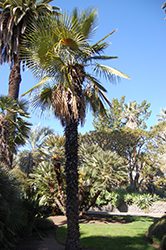It's all about ...
plants

Height: 20 feet
Spread: 10 feet
Sunlight:
![]()
![]()
Hardiness Zone: 8b
Other Names: Brazilian Needle Palm, Trithrinax brasiliensis
Description:
This solitary variety makes a great garden or landscape accent; large, beautiful dark green fan-like leaves, crown a trunk that has an interesting woven, cross hatch pattern with sharp spines; tolerates drought and adapts to a wide variety of soils
Ornamental Features
Spiny Fiber Palm is primarily grown for its highly ornamental fruit. The fruits are showy yellow drupes carried in abundance from late summer to mid fall. It has attractive dark green evergreen foliage. The large lobed palmate leaves are highly ornamental and remain dark green throughout the winter. It features subtle panicles of creamy white flowers held atop the branches in mid summer. The rough brown bark adds an interesting dimension to the landscape.
Landscape Attributes
Spiny Fiber Palm is an open evergreen tree with a strong central leader and a towering form, with a high canopy of foliage concentrated at the top of the plant. Its average texture blends into the landscape, but can be balanced by one or two finer or coarser trees or shrubs for an effective composition.
This is a relatively low maintenance tree, and is best pruned in late winter once the threat of extreme cold has passed. Gardeners should be aware of the following characteristic(s) that may warrant special consideration;
- Spiny
Spiny Fiber Palm is recommended for the following landscape applications;
- Accent
- Hedges/Screening
- General Garden Use
- Naturalizing And Woodland Gardens
- Container Planting
Planting & Growing
Spiny Fiber Palm will grow to be about 20 feet tall at maturity, with a spread of 10 feet. It has a high canopy of foliage that sits well above the ground, and is suitable for planting under power lines. As it matures, the lower branches of this tree can be strategically removed to create a high enough canopy to support unobstructed human traffic underneath. It grows at a slow rate, and under ideal conditions can be expected to live for 50 years or more. This is a dioecious species, meaning that individual plants are either male or female. Only the females will produce fruit, and a male variety of the same species is required nearby as a pollinator.
This tree does best in full sun to partial shade. It does best in average to evenly moist conditions, but will not tolerate standing water. It is not particular as to soil type or pH. It is highly tolerant of urban pollution and will even thrive in inner city environments. This species is not originally from North America.
Spiny Fiber Palm is a fine choice for the yard, but it is also a good selection for planting in outdoor pots and containers. Because of its height, it is often used as a 'thriller' in the 'spiller-thriller-filler' container combination; plant it near the center of the pot, surrounded by smaller plants and those that spill over the edges. It is even sizeable enough that it can be grown alone in a suitable container. Note that when grown in a container, it may not perform exactly as indicated on the tag - this is to be expected. Also note that when growing plants in outdoor containers and baskets, they may require more frequent waterings than they would in the yard or garden. Be aware that in our climate, most plants cannot be expected to survive the winter if left in containers outdoors, and this plant is no exception. Contact our experts for more information on how to protect it over the winter months.
This plant is not reliably hardy in our region, and certain restrictions may apply; contact the store for more information.
